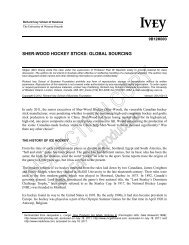foundation of canada asia pacific - Content Tagged with
foundation of canada asia pacific - Content Tagged with
foundation of canada asia pacific - Content Tagged with
Create successful ePaper yourself
Turn your PDF publications into a flip-book with our unique Google optimized e-Paper software.
the term “development assistance” for this very reason. As a result, APEC has created an<br />
alternative way <strong>of</strong> describing this sort <strong>of</strong> activity, by coining the term “economic and<br />
technical cooperation” or “Ecotech” in APECspeak. Ecotech is supposed to embody the<br />
new characteristics <strong>of</strong> regional cooperation, namely common interests, pooling <strong>of</strong> resources<br />
and mutual respect. It implies a relationship <strong>of</strong> equal partners, the opposite <strong>of</strong> the donorrecipient<br />
relationship. There is considerable wishful thinking embodied in the notion <strong>of</strong><br />
Ecotech, but it nevertheless points to the new and real complexity <strong>of</strong> international<br />
cooperation in an age <strong>of</strong> highly integrated and interdependent economies.<br />
Ottawa’s challenge is to manage this multifaceted approach rationally. First, there must<br />
be a better understanding <strong>of</strong> which government departments are involved in international<br />
cooperation activities, why they are doing so, and what relation these activities have to<br />
Canada’s overall development assistance effort. Departments apart from CIDA and DFAIT<br />
have become involved in overseas activities generally for one <strong>of</strong> three reasons: obligations<br />
growing out <strong>of</strong> Canada’s membership in an international organization; the direct or<br />
indirect promotion <strong>of</strong> Canadian commercial interests; or a desire to sell public sector<br />
expertise in international markets.<br />
61<br />
Canada’s role in APEC has drawn domestic departments like Human Resources<br />
Development, Revenue or Transport into international cooperation ventures. Some<br />
<strong>of</strong> these activities are funded through CIDA, while some are not. Projects on behalf <strong>of</strong><br />
CIDA are, by definition, included as part <strong>of</strong> Canada’s ODA, but similar projects carried<br />
out independently by other departments are not counted. As an example, CIDA has<br />
funded a project designed to improve fish inspection and quality control in developing<br />
Southeast Asian economies. Inspectors from the Department <strong>of</strong> Fisheries and Oceans<br />
(who have since been transferred to the newly formed Food Inspection Agency) have<br />
been principal participants. As part <strong>of</strong> their regular duties, however, these <strong>of</strong>ficials are<br />
also involved in consultations and technical assistance activities <strong>with</strong> the same Southeast<br />
Asian countries. The former is counted as ODA, the latter is not, even though the<br />
activities are very similar in scope.<br />
National commercial interest is another reason for departments to turn their attention<br />
<strong>of</strong>fshore. This is hardly a new driver, as it has been an implicit, if downplayed, factor in<br />
many CIDA projects for years. However, new players like the National Research Council<br />
and Environment Canada have moved into the field, promoting demonstration projects<br />
involving Canadian technology. Today, Canadian technology is <strong>of</strong>ten transferred<br />
abroad through SMEs and joint ventures involved in the quasi-assistance projects. The<br />
emphasis is on partnerships related to innovation and capacity building, as well as the<br />
mutual benefits to overseas partners and Canadian companies, opening the door to followup<br />
commercial ties.<br />
The drive to sell public sector expertise is, in part, a reaction to Ottawa’s funding cutbacks,<br />
and, in part, a recognition by other countries <strong>of</strong> Canadian expertise. Canada is regarded<br />
as a well-regulated, and sometimes over-regulated, country. In areas ranging from broadcast<br />
standards to town planning or public health we are acknowledged for our administrative<br />
expertise. Growing international standardization in a range <strong>of</strong> products and services, an<br />
outgrowth <strong>of</strong> globalization, is leading to more opportunities for the Canadian government



